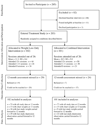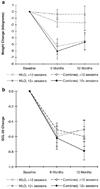A randomized controlled trial of behavioral weight loss treatment versus combined weight loss/depression treatment among women with comorbid obesity and depression
- PMID: 20878292
- PMCID: PMC3033656
- DOI: 10.1007/s12160-010-9232-2
A randomized controlled trial of behavioral weight loss treatment versus combined weight loss/depression treatment among women with comorbid obesity and depression
Abstract
Background: Obesity is associated with clinical depression among women. However, depressed women are often excluded from weight loss trials.
Purpose: This study examined treatment outcomes among women with comorbid obesity and depression.
Methods: Two hundred three (203) women were randomized to behavioral weight loss (n = 102) or behavioral weight loss combined with cognitive-behavioral depression management (n = 101).
Results: Average participant age was 52 years; mean baseline body mass index was 39 kg/m(2). Mean Patient Health Questionnaire and Hopkins Symptom Checklist (SCL-20) scores indicated moderate to severe baseline depression. Weight loss and SCL-20 changes did not differ between groups at 6 or 12 months in intent-to-treat analyses (p = 0.26 and 0.55 for weight, p = 0.70 and 0.25 for depressive symptoms).
Conclusions: Depressed obese women lost weight and demonstrated improved mood in both treatment programs. Future weight loss trials are encouraged to enroll depressed women.
Trial registration: ClinicalTrials.gov NCT00169273.
Conflict of interest statement
Figures



References
-
- Thande NK, Hurstak EE, Sciacca RE, Giardina EGV. Management of obesity: A challenge for medical training and practice. Obes. 2008;17:107–113. - PubMed
-
- Goldstein LT, Goldsmith SJ, Anger K, Leon AC. Psychiatric symptoms in clients presenting for commercial weight reduction treatment. Int J Eat Disord. 1996;20:191–197. - PubMed
-
- Clark MM, Niaura R, King TK, Pera V. Depression, smoking, activity level, and health status: Pretreatment predictors of attrition in obesity treatment. Addict Behav. 1996;21:509–313. - PubMed
Publication types
MeSH terms
Associated data
Grants and funding
LinkOut - more resources
Full Text Sources
Medical
Research Materials
Miscellaneous

